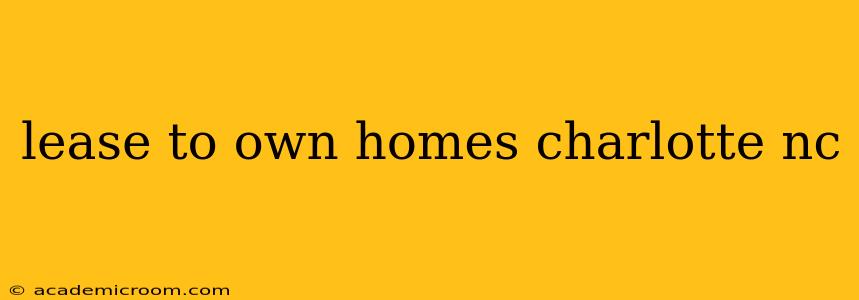Charlotte, NC, a vibrant city brimming with opportunity, attracts many seeking homeownership. However, traditional home buying can be daunting, especially for first-time homebuyers or those facing financial challenges. Lease-to-own (rent-to-own) homes offer an alternative path to homeownership, allowing you to gradually build equity and eventually purchase the property. This guide explores lease-to-own homes in Charlotte, NC, addressing common questions and concerns.
What is a Lease-to-Own Agreement?
A lease-to-own agreement, also known as a rent-to-own agreement, is a contract where a tenant pays rent with a portion applied towards the eventual purchase of the home. It differs significantly from a standard rental agreement. A critical element is the option to purchase the property at a predetermined price within a specified timeframe. This option isn't guaranteed; it's contingent upon fulfilling the terms of the agreement, which typically includes on-time rent payments and adherence to property maintenance responsibilities.
How Does a Lease-to-Own Home Work in Charlotte?
The process generally involves these key steps:
-
Finding a Suitable Property: Locating a lease-to-own home in Charlotte often requires working with real estate agents specializing in these arrangements or searching online marketplaces with specific filters.
-
Negotiating the Contract: The agreement meticulously outlines the monthly rent, the purchase price (often slightly higher than market value to account for the option), the option period, the down payment, and the terms of ownership transfer. Legal counsel is strongly recommended during this phase.
-
Making Payments: Monthly payments typically consist of rent and a portion allocated toward the future purchase price. This portion often builds equity, although the specifics are contractually defined.
-
Property Maintenance: The agreement clearly defines the responsibilities of both parties regarding property maintenance and repairs. Typically, the tenant is responsible for routine maintenance while the homeowner addresses major repairs.
-
Purchase Option: Upon fulfilling the agreement's terms within the stipulated time frame, the tenant exercises their option to purchase the home at the pre-agreed price. This usually requires securing financing, typically a mortgage. If the tenant fails to meet the terms, they may forfeit their investment.
What are the Advantages of Lease-to-Own Homes in Charlotte?
-
Building Equity: A significant advantage is the opportunity to build equity while renting. This is a crucial step toward future homeownership.
-
Improved Credit Score: Consistent on-time payments can positively impact your credit score, making securing a mortgage easier when it's time to buy.
-
Time to Save: Lease-to-own allows you to save for a down payment and closing costs gradually.
-
Opportunity for Home Improvement: Some agreements allow for home improvements, enhancing the property value before purchase.
What are the Disadvantages of Lease-to-Own Homes in Charlotte?
-
Higher Overall Cost: The purchase price is often slightly higher than market value, and the total cost over the lease period might exceed purchasing a comparable home through traditional methods.
-
Risk of Forfeiture: Failing to meet the agreement's terms can lead to losing the money invested towards the purchase price.
-
Limited Flexibility: The terms of the contract are legally binding and offer less flexibility than a traditional rental agreement.
-
Potential for Hidden Costs: Thorough contract review by legal counsel is essential to avoid unforeseen costs or unfavorable terms.
How Do I Find Lease-to-Own Homes in Charlotte, NC?
Finding lease-to-own properties requires a targeted approach:
-
Work with a Real Estate Agent: Experienced real estate agents specializing in lease-to-own arrangements possess the expertise to navigate the process effectively.
-
Online Marketplaces: Several online platforms allow filtering for lease-to-own listings.
-
Networking: Connecting with individuals and groups within the Charlotte community can unearth potential opportunities.
What Are the Legal Aspects of Lease-to-Own Agreements?
Consult with a real estate attorney before entering any lease-to-own agreement. They will ensure the contract is fair and protects your rights, clarifying all terms and conditions, and addressing any legal ramifications. This is crucial to mitigate risks.
How Much Does a Lease-to-Own Home Cost in Charlotte?
The cost varies significantly depending on location, property size, and contract terms. Researching comparable properties and consulting with real estate professionals provides a better understanding of potential costs.
Is a Lease-to-Own Agreement Right for Me?
Lease-to-own homes offer a pathway to homeownership, but it's not the ideal solution for everyone. Carefully weigh the advantages and disadvantages based on your individual financial situation, risk tolerance, and long-term goals. Thorough research and professional advice are key to making an informed decision.
